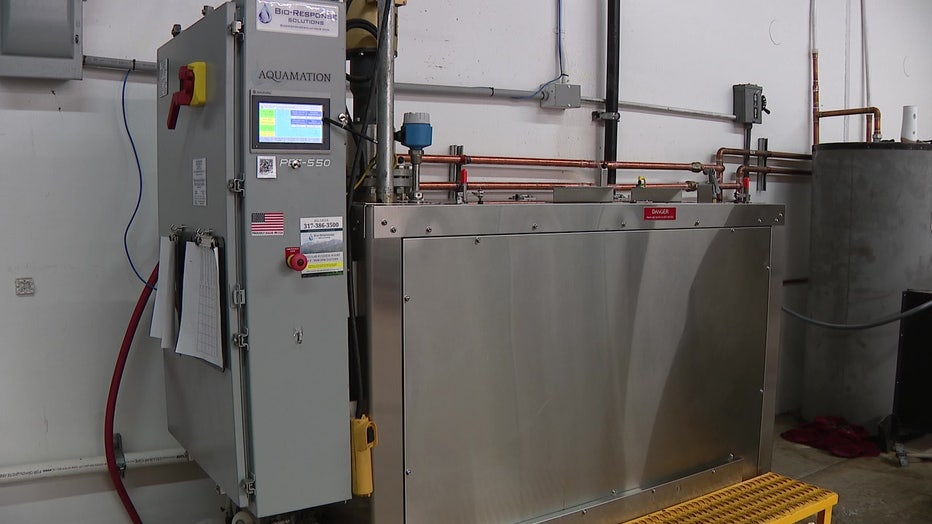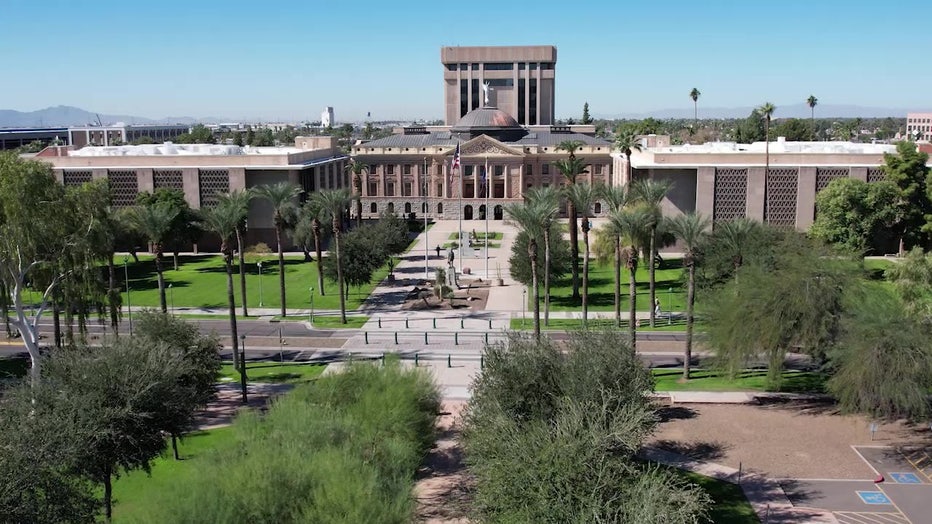What is aquamation, an environmentally-friendly alternative to burials and cremations
PHOENIX - When it comes to burials, Americans overwhelmingly choose either burying their loved ones or cremating them, according to figures from the National Funeral Directors Association.
However, there are now alternatives the two traditional choices listed above.
Here's what to know about aquamation, along with the major implications and concerns with it.
What's aquamation?

Aquamation: AZ still needs rules on burial method
While figures show many Americans still prefer the traditional burial or cremation for a funeral, a more environmentally-friendly alternative is emerging. In Arizona, however, new regulations are still needed for aquamation, despite it being legalized by the State Legislature. FOX 10's Steve Nielsen has more.
According to a 2022 article by the Canadian Broadcasting Corporation, aquamation, also known as alkaline hydrolysis, is a form of cremation.
The article states that instead of using fire, aquamation uses water mixed with an alkali in a stainless steel cylinder. The water-alkali mixture is then heated to a certain temperature, which, over time, will dissolve all tissues on a person's remains.
The alkali substance, according to the website USFuneralsOnline, can be either potassium hydroxide or sodium hydroxide.
According to the Merriam-Webster Dictionary, potassium hydroxide is chiefly used in making soap, while sodium hydroxide can be used to make paper, rayon, and soap.
"That alkaline salt is what accelerates the breakdown of soft tissues," said Matthew Mansour with Aquacrossings in Tempe, Ariz., which offers aquamation for pets. "With an aquamation, there's no acid. We're not dissolving them in lye. No pressure. It really is a gentle process."
On the website of the Cremation Association of North America, it is stated that at the end of aquamation, the liquid used in the process, called "effulent," is sterile, and can be discharged with all other wastewater, in accordance with local regulations.
"In some cases, the water is diverted and used for fertilizer because of the potassium and sodium content," read a portion of CANA's website.
Bone fragments that are left behind, according to CANA's website, will need to be dried and cooled after the process.
Is aquamation a new thing?

A machine used for Aquamation
According to CANA's website, aquamation was developed and patented in 1888 by a farmer who was looking for ways to make fertilizer from animal carcasses.
The first commercial aquamation system, according to CANA's website, was installed at Albany Medical College in 1993 to dispose of human cadavers, and began to be used in the funeral industry in 2011.
As mentioned above, equation is now becoming an alternative to burial and cremation for those who are mourning the death of a loved one.
Are there any well-known cases of aquamation?

Archbishop Emeritus Desmond Tutu of South Africa, in a photo taken in 2005. Tutu passed away in 2021. (Photo by Paul Hawthorne/Getty Images)
According to a 2021 report by the BBC, Archbishop Desmond Tutu, a South African activist who campaigned against the country's racially-discriminatory system in the past known as Apartheid, underwent aquamation following his death at the age of 90.
In an article published by Reuters, it was reported that South Africans were surprised at Archbishop Tutu's choice, and some South Africans were also impressed by a move that is considered to be environmentally conscious.
Is aquamation better for the environment than burials or cremation?
According to CBC's report, aquamation is considered to be a more environmentally-friendly option than burial, as embalming chemicals or caskets are not required.
The article also notes that while aquamation requires electricity and water in its process., it is still considered to be a more environmentally-friendly option than cremation involving the use of fire, as energy use by aquamation is about 80% to 90% less than fire-based cremation.
In addition, fire-based cremations, according to the CBC article, emit almost 800,000 tons of carbon dioxide in the U.S., as well as emitting toxic pollutants, due to cavity fillings and/or replacement hips that a person may have before he or she died.
Is aquamation legal?

The Arizona State Capitol. In Arizona, aquamation is legalized by law, but regulatory rulemaking will only begin in September 2023.
According to USFuneralsOnline's website, aquamation is, as of 2021, legal in 28 states, including Arizona.
The website also notes that not all states that have legalized aquamation actually have funeral service providers with aquamation as an option for those in need of funeral services.
In the case of Arizona, while a law is passed to allow for aquamation, there is a holdup involving regulations and rulemaking that means aquamation is still not available for human remains.
Officials with the state's Department of Health Services say they are scheduled to start the rulemaking process in September 2023, but the process might take some time.
"There are so many unknowns and so many things people are asking questions they need to understand," said Elisa Krcilek with Mountain View Funeral Home.
Meanwhile, aquamation for pets is already happening in Arizona, as we mentioned above.
Are there any other concerns or implications with aquamation?
Cost
Aquamation, according to USFuneralsOnline, still costs more than cremation in some cases. However, the same website also states that aquamation costs less than a traditional burial.
Popular depiction
A 2020 article published by CNET states that at times, popular culture has depicted the process that resembles aquamation in a less-than-positive light. The article cited an episode of Breaking Bad where a character dissolved a dead body using hydrofluoric acid, with disastrous results.
The article called the depiction in Breaking Bad "far from realistic."
(Some may find the YouTube video below distressing. The video shows a scene from the TV show Breaking Bad, which is a work of fiction. Viewer discretion is advised.)
Social Media claims
Claims made on social media have also cast aquamation in a negative light. In 2023, the Associated Press reported that there were claims on social media that aquamation liquid was fed into municipal water supplies.
In response, Environmental Protection Agency officials told the AP that they are "not aware of any direct connections of untreated waste from alkaline hydrolysis cremation facilities directly into a drinking water plant."
"EPA is also unaware of any alkaline hydrolysis byproducts, including the mineral constituents of bones and teeth, being used in any drinking water treatment process," wrote Timothy Carroll with the EPA, in an e-mail to the AP.
Religion

A woman holds rosary beads while she prays. (Photo by Dan Kitwood/Getty Images)
Another concern over aquamation has to do with religion, as there have been questions over whether aquamation is in line with religious ethics.
According to the website of Eirene Cremations, a funeral service provider that also provides aquamation in Canada, some members of the Catholic Church clergy have voiced opposition to aquamation, with the former Archbishop of Washington, Donald Wuerl, calling aquamation "unnecessarily disrespectful of the human body."
"Similarly, the Catholic Conference of Ohio said: ‘Dissolving bodies in a vat of chemicals and pouring the resultant liquid down the drain is not a respectful way to dispose of human remains,’" read a portion of the website.
However, a document posted on the website of the Roman Catholic Archdiocese of St. Louis states that the Vatican has not weighed on the "specific moral implications of alkaline hydrolysis."
Eirene Cremations' website also states that aquamation might be prohibited by some sects of Judaism, and is considered to be forbidden in Islam. The website also claims that aquamation might be considered to be acceptable by followers of the Buddhism, Hinduism, or Sikhism faith.
Commercial feasibility
Casting aside the concerns or implications listed above, commercial considerations could be another factor in the availability of aquamation.
"A funeral home has to make a decision: how many families am I going to serve that will choose this as an option, and how long will it take to recoup my investment?" said Krcilek. "We here ask ourselves three simple questions: is it legal? Is it ethical? Is it feasible? We got past the legality. Certainly past the ethical. Now, it's the feasibility, and if it's a good direction and route to offer our families."
Krcilek said they are going to start reaching out to families they have cared for in the past to get their thoughts on aquamation, in an effort to see if the investment in the equipment necessary for such services would be worth it.

